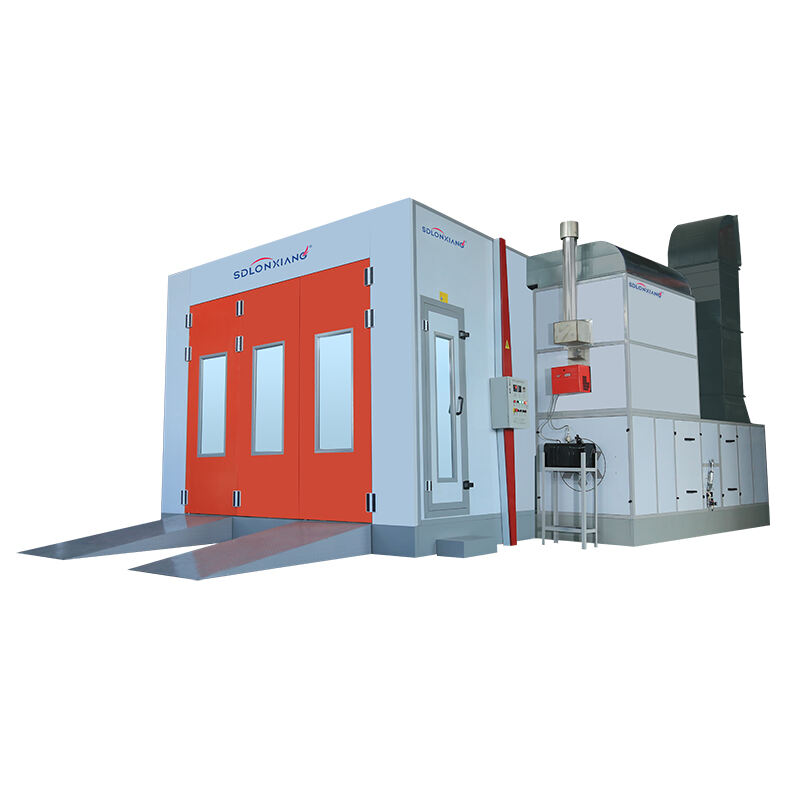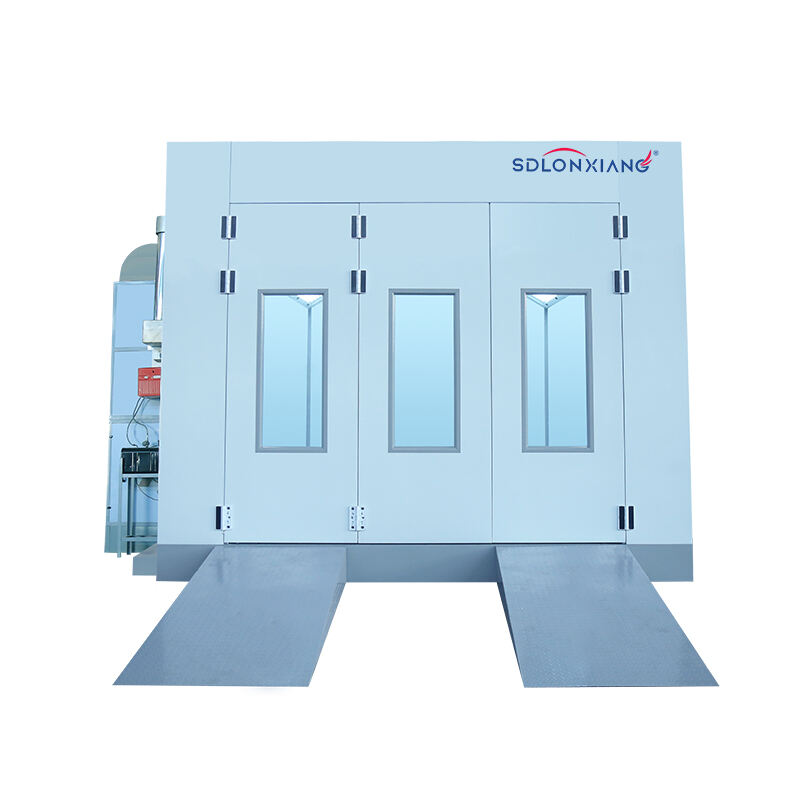Understanding CE and ISO Compliance in Industrial Spray Booths
The Role of CE Certification in EU Market Access
CE certification is essential for industrial equipment, like spray booths, entering the EU market. This certification serves as a mandatory requirement, without which manufacturers might face market access barriers. By obtaining CE certification, a product demonstrates adherence to EU directives, signaling a commitment to consumer safety and environmental protection. This not only enhances the product’s credibility but also assures consumers of its quality and reliability. The certification process involves rigorous evaluation, including testing and assessments by accredited bodies, which underscores the manufacturer's due diligence and commitment to quality standards.
ISO Standards' Global Impact on Safety Protocols
ISO standards, such as ISO 9001 and ISO 14001, have a profound impact on safety protocols within industrial applications. These standards set global benchmarks for quality management and environmental practices, directly contributing to enhanced safety measures and reduced workplace accidents. Implementing ISO standards involves adopting best practices and conducting thorough risk assessments. Organizations that comply with these standards often see increased operational efficiency and earn greater trust from their customers. This adherence opens doors for strengthened international trade relationships, boosting global presence and reputation.## Core CE Certification Requirements for Industrial Spray Booths
Electrical Safety and Hazard Prevention Measures
Ensuring electrical safety is a fundamental aspect of CE certification for industrial spray booths. This certification demands rigorous standards focused on electrical grounding, overload protection, and regular maintenance checks. These measures are pivotal in preventing electrical fires and accidents within the spray booths. In addition, incorporating circuit designs that minimize the risks of electric shock and short circuits is crucial. Such precautions play a significant role in safeguarding the operators, ensuring their safety and maintaining the operational integrity of the spray booths.
Material Durability and Fire Resistance Testing
Material durability and fire resistance testing form the backbone of CE compliance for industrial spray booths. The testing ensures that the materials can endure operational stresses under various environmental conditions. Compliance with these standards includes subjecting materials to heat and flame exposure tests to assess their performance under fire conditions. This process is crucial not only for the protection of personnel but also to safeguard the integrity of infrastructural facilities. By ensuring materials are both durable and fire-resistant, manufacturers uphold high safety standards, aligning with the stringent demands of CE certification.

Mandatory Documentation for CE Compliance
In the pursuit of CE compliance, manufacturers are required to compile a comprehensive technical file. This file must contain all relevant documentation, such as risk assessments, declarations of conformity, and maintenance logs, demonstrating adherence to safety standards. Such documentation is instrumental in ensuring that operations remain transparent and can be reviewed by regulatory bodies as needed. The availability of these documents fortifies the organization's commitment to maintaining operational safety and upholding regulatory compliance, which is essential for the acquisition and retention of CE certification.## ISO 12100 Risk Reduction Strategies in Booth Design
Implementing Mechanical Risk Assessment Protocols
Utilizing ISO 12100 guidelines is crucial for systematically identifying and addressing potential mechanical hazards in spray booth designs. This thorough identification process enables manufacturers to take proactive measures, significantly reducing the risk of injuries or accidents. By implementing sound mechanical risk assessment protocols, we can effectively evaluate and mitigate risks associated with machinery operation, maintenance, and design. Such comprehensive evaluations help in safeguarding operators and ensuring smoother, safer operations within industrial spray booths.
Engineering Controls for Hazard Mitigation
Engineering controls are essential for mitigating hazards in industrial spray booths by isolating hazards and automating processes. These controls play a critical role in minimizing human error and thereby enhancing safety. By implementing safety features that comply with ISO standards, not only do we improve safety, but we also enhance operational efficiency. Utilizing these engineering controls ensures that our spray booths maintain high safety standards, making them more reliable for operational needs. This approach aligns with our commitment to ISO compliance, underlining the importance of integrating safety with efficiency in industrial settings.## Ventilation Standards: Meeting ISO 14644 Classifications
Airflow Requirements for Hazardous Particulate Control
Implementing ventilation systems that adhere to ISO 14644 airflow requirements is crucial for minimizing airborne contaminants and enhancing operator safety. These standards help ensure that spray booths effectively control hazardous particles, maintaining a safe working environment. Proper airflow management not only addresses safety concerns but also contributes to maintaining the quality standards of products processed in spray booths. By aligning with stringent ISO 14644 classifications, we are able to systematically reduce risks and promote a healthier workplace, safeguarding both the operator and the work being conducted.
Filter Efficiency Testing and Maintenance Cycles
To stay compliant with ventilation standards like ISO 14644, it's vital to conduct regular filter efficiency tests and adhere to maintenance schedules for optimal performance. Regular maintenance helps prevent the accumulation of harmful particles, ensuring the longevity of spray booth equipment. The reliability of the ventilation system heavily depends on filter efficiency, which is why scheduled testing and timely replacements are indispensable. Not only does this safeguard the integrity of equipment, but it also ensures continuous compliance with the required safety regulations, ultimately sustaining a clean and safe operational environment.## Operational Safety: Grounding and Spark-Proof Systems
Static Electricity Dissipation Techniques
In the realm of spray booths, managing static electricity is crucial to preventing the ignition of flammable vapors. Incorporating static electricity dissipation techniques ensures operational safety and reduces possible fire hazards. Standards and guidelines provided by occupational safety organizations offer invaluable recommendations. For instance, grounding and bonding are fundamental techniques widely adopted to dissipate static charge, thereby enhancing worker safety in industrial spray booths. According to the Occupational Safety and Health Administration (OSHA) and the National Fire Protection Association (NFPA), specific grounding requirements are necessary for equipment handling volatile substances. By following these standards, businesses can ensure a safer working environment while protecting their employees from potential risks associated with static electricity.
Selecting Explosion-Proof Electrical Components
Selecting explosion-proof electrical components is not just a regulatory requirement but a crucial safety measure in environments exposed to flammable substances. When spray booths are equipped with these specialty components, such as sealed lighting fixtures and non-sparking fans, compliance with safety regulations is achieved. This compliance significantly reduces the risk of catastrophic failures, enhancing both the safety and efficiency of operations. OSHA guidelines emphasize the importance of explosion-proof equipment to prevent the ignition of flammable vapors. By installing such components, businesses can improve overall safety in spray booths, ensuring an uninterrupted and hazard-free operational workflow.## Conducting Routine CE/ISO Safety Audits
Conducting routine CE and ISO safety audits is integral to maintaining compliance with federal and international safety standards. These audits serve as a vital checkpoint for organizations to assess their current safety measures against industry benchmarks. By regularly evaluating safety protocols, businesses can identify areas of improvement, ensuring that they consistently meet and exceed required safety criteria. Moreover, these audits allow for the prompt rectification of compliance gaps, enabling the advancement of safer workplace practices. The proactive identification of potential hazards through audits also supports a culture of continuous improvement and accountability, ultimately safeguarding employees and assets.
Record-Keeping for International Standard Updates
Effective record-keeping is essential for staying ahead of changes in international safety standards and compliance requirements. By meticulously documenting adherence to current standards, organizations can promptly adapt to regulatory updates. This thorough documentation not only assists during audits but also enhances organizational credibility, demonstrating a strong commitment to safety and compliance. Proper records could mean the difference between successfully passing an audit or facing penalties due to lapses in compliance. Overall, diligent record-keeping fosters a more secure and efficient operational environment, allowing businesses to navigate regulatory landscapes with confidence.
Training Programs for Ongoing Protocol Adherence
Implementing comprehensive training programs is crucial for ongoing adherence to safety protocols and compliance requirements. Regular training sessions ensure that employees remain knowledgeable about the latest safety standards and procedures. This continuous education reinforces safe practices and cultivates a culture of safety awareness across the organization. Through effective training, organizations can minimize workplace accidents and enhance compliance, ultimately contributing to higher operational efficiency and employee well-being. Furthermore, a well-educated workforce can better identify and respond to potential hazards, significantly reducing risks and promoting a safer work environment.
FAQ
What is CE certification and why is it important for industrial spray booths?
CE certification is a mandatory standard for market access in the EU, ensuring that industrial spray booths meet safety and environmental protection requirements. It enhances product credibility and assures consumers of quality.
How do ISO standards impact industrial spray booth safety protocols?
ISO standards set global benchmarks for quality and environmental practices. They enhance safety protocols by encouraging best practices and risk assessments, reducing workplace accidents, and improving operational efficiency.
What are the key components of CE compliance for industrial spray booths?
Key components include electrical safety measures, material durability and fire resistance testing, and mandatory documentation like risk assessments and maintenance logs.
Why are ventilation standards important in industrial spray booths?
Ventilation standards like ISO 14644 are crucial for controlling airborne contaminants, ensuring operator safety, and maintaining product quality in spray booths.
How can businesses ensure continuous compliance with CE/ISO standards?
Businesses can conduct routine safety audits, keep meticulous records of adherence to standards, and implement regular training programs to maintain compliance and adapt to updates.
Table of Contents
-
Understanding CE and ISO Compliance in Industrial Spray Booths
- The Role of CE Certification in EU Market Access
- ISO Standards' Global Impact on Safety Protocols
- Electrical Safety and Hazard Prevention Measures
- Material Durability and Fire Resistance Testing
- Mandatory Documentation for CE Compliance
- Implementing Mechanical Risk Assessment Protocols
- Engineering Controls for Hazard Mitigation
- Airflow Requirements for Hazardous Particulate Control
- Filter Efficiency Testing and Maintenance Cycles
- Static Electricity Dissipation Techniques
- Selecting Explosion-Proof Electrical Components
- Record-Keeping for International Standard Updates
- Training Programs for Ongoing Protocol Adherence
-
FAQ
- What is CE certification and why is it important for industrial spray booths?
- How do ISO standards impact industrial spray booth safety protocols?
- What are the key components of CE compliance for industrial spray booths?
- Why are ventilation standards important in industrial spray booths?
- How can businesses ensure continuous compliance with CE/ISO standards?

